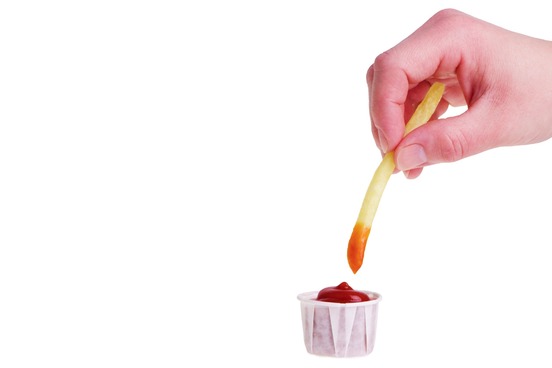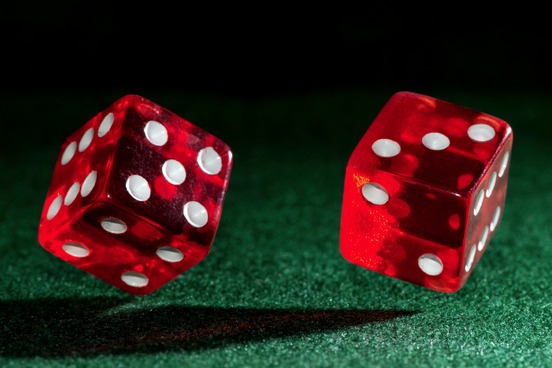
Karaoke
Many English words come from other languages, but this list highlights some of our favorites from non-Romance languages - i.e. they don't trace back to Latin - that sound almost the same in the original.
Language of Origin:
Japanese
About the Word:
Karaoke, the beloved/hated entertainment that involves non-professional singers performing without live bands, has a poetic-sounding origin: "empty orchestra."
It comes from the Japanese kara ("empty") + ōke, short for ōkesutora ("orchestra").
That same kara also appears in karate: "empty" + te ("hand").
Karaoke became popular in Japan among businessmen in the late 1970s, and gained widespread popularity in the U.S. in the late 1980s.
Like a bad karaoke singer, Labor leader Anthony Albanese only seems to know the words to the Abba song Money, Money, Money.
— (letter to ed.), The Daily Telegraph (Surry Hills, Aus.), 10 Oct. 2020

Kerfuffle
Language of Origin:
Scottish Gaelic
About the Word:
Kerfuffle means "disturbance or fuss," often describing a situation that's received more attention than it deserves.
"Fuffle" was first used in Scottish English, as early as the 16th century, as a verb meaning "to dishevel." The addition of the prefix "car-" (possibly derived from a Scottish Gaelic word meaning "wrong" or "awkward") barely changed the word's meaning. In the 19th century "carfuffle" became a noun, and in the mid-20th century it was embraced by a broader population of English speakers and standardized to "kerfuffle."
There really seems to be this huge kerfuffle as far as surprises from the water company, she said.
— Sarah Elms, The Blade (Toledo, OH), 21 May 2021

Chutzpah
Language of Origin:
Yiddish
About the Word:
Chutzpah comes from the Yiddish khutspe, meaning "impudence."
In American English, chutzpah describes a particular kind of nerve, or gall. It refers to the supreme self-confidence that allows a person to do or say things that may seem shocking to others.
In one classic illustration of the concept, a man convicted of killing his parents asks the court for mercy because he's an orphan. That's chutzpah!
Thank you for being here. So I got to say, it takes some serious chutzpah to say, yeah, let's do a remake of, like the most beloved baseball film in history. Why did you take this on?
— All Things Considered (transcript with Daniel Estrin & Abbi Jacobson), 6 Aug. 2022

Kowtow
Language of Origin:
Chinese
About the Word:
To "kowtow" is to agree too easily or eagerly to do what someone else wants you to do, or to obey someone with power in a way that seems weak.
It comes from the Chinese kòutóu - kòu ("to knock") plus tóu ("head") - and originally referred to kneeling and touching one's head to the ground as a salute or act of worship to a revered authority.
In traditional China, this ritual was performed by commoners making requests to the local magistrate, by the emperor to the shrine of Confucius, or by foreign representatives appearing before the emperor to establish trade relations.
In the late 18th century, some Western nations resisted performing the ritual, which acknowledged the Chinese emperor as the "son of heaven."
The noun arrived in English in the early 1800s, and within a few decades had taken on the "fawn" or "suck up" verb meaning we use today.
Mr. Raut had called Mr. Shinde’s Delhi visits “a blow to the State’s pride” while stating that it was humiliating that a Shiv Sena leader had to “kowtow to the Centre” whereas in the past BJP leaders (including Mr. Shah) had had to come down to ‘Matoshree’ (the Thackerays’ private residence in Mumbai).
— The Hindu (Chennai, Ind.), 5 Aug. 2022

Schadenfreude
Language of Origin:
German
About the Word:
The German Schaden means "damage"; Freude means "joy"; the compound Schadenfreude means "enjoyment obtained from the troubles of others."
As the Schadenfreude song from Avenue Q puts it: "And when I see how sad you are / It sort of makes me... / Happy!"
It's been a rough few weeks for influencers. Which is not a sentence that's going to inspire sympathy in the hearts of many, given that the best part of influencer culture is the sweet, sweet schadenfreude we all get when we watch their digital downfall.
— Verity Johnson, The Press (Christchurch, NZ), 3 Jul. 2020

Apparatchik
Language of Origin:
Russian
About the Word:
Nowadays, apparatchik is generally used as a mild insult for a blindly devoted official, follower, or member of an organization, such as a corporation or political party.
For example, an Op-Ed piece in the New York Times described a London mayoral candidate as, "a lifelong left-wing activist, a local government apparatchik, a consummate manipulator of subcommittees and votes of confidence."
Originally the word referred specifically to a Communist official or agent. It comes from the Russian apparat meaning "party machine" - and for much of the 20th century specifically "the political machine of the Communist party" - + -chik, an agent suffix.
Then, 11 days after Pavlov's fatal plunge, Dmitry Lisoviolik, another high-level apparatchik in the party's financial affairs — this time the international department — did the same.
— Richard Pendlebury, The Daily Mail (London, Eng.), 5 Aug. 2022
MORE: 10 Words from Russian

Boondocks
Language of Origin:
Tagalog
About the Word:
Boondocks (and boonies) both mean "a rural area," particularly one considered backward, dull, or unsophisticated.
In Tagalog, the language that is the base for Filipino, an official language of the Philippines, bundok means "mountains." Following the Philippine Revolution of 1898, the occupying American military forces adopted "boondocks" and broadened its meaning to refer to the wild and rural country they found there.
In a long lifetime of reading, I don’t ever recall a more disastrous vacation than the one truecrime podcaster Anna McDonald arranges for her convoluted blended family and her partner, Fin Cohen, and his girlfriend. They are in the boondocks with no decent roads, the internet is out and the weather is godawful.
— Margaret Cannon, The Globe and Mail (Toronto, Can.), 6 Aug. 2022

Ketchup
Language of Origin:
Malay
About the Word:
This all-American condiment started out as a spicy, fermented fish sauce in Malaysia.
That version, known as kěchap, made its way first to Europe and then to the New World, where tomatoes eventually became the defining ingredient.
Elsewhere, ketchup retains an earlier identity. Traditional English ketchup, for example, is a pureed seasoning based on mushrooms, unripe walnuts, or oysters.
I thought about smearing ketchup on the envelope, but I didn't want the United States postal inspectors charging me with sending biohazards through the mail.
—1 Norris Burkes, Springfield News-Leader (Springfield, MO), 8 Sept. 2018
Language of Origin:
Hindi
About the Word:
A juggernaut is something (such as a force, campaign, or movement) that is huge and powerful and can't be stopped.
The word rolled into English from Hindi with a fairly terrifying image.
It comes from Jagannāth (Hindi for "Lord of the World"), the title of the Hindu god Vishnu. According to some exaggerated but widespread reports dating back to the 14th century, during parades in India, devotees of Vishnu would sacrifice themselves by being crushed beneath the wheels of carriages carrying images of Vishnu.
After the massive crossover eruptions of the 1960s—most famously that of Berry Gordy’s Motown Records, but also the Southern soul juggernauts of Memphis and Muscle Shoals—by the end of that decade American pop had again become increasingly segregated.
— Jack Hamilton, Black Camera (Bloomington, Ind.), Fall 2022

Hazard
Language of Origin:
Arabic
About the Word:
Hazard dates to the time of the Crusaders and involves a game of chance.
According to the most likely theory, the original hazard ("al-zahr," in Arabic) was a die. Players would roll the dice and bet on the outcome.
English got the word from French. In English, hazard eventually came to name any chance, risk, or source of danger.
And, perhaps the best thing of all, I wasn't caught up in that last minute Christmas shopping rush where disappointment can be a major hazard.
— Southern Highland News, (Bowral, Aus.), 8 Aug. 2022






